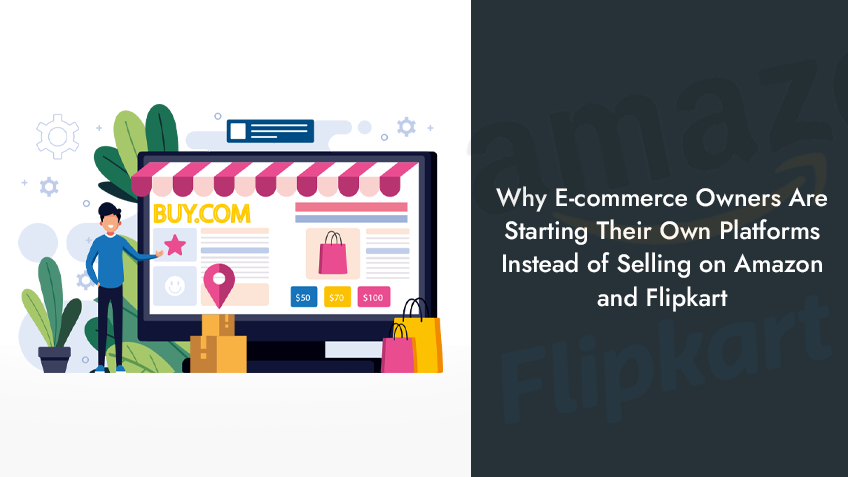In recent years, e-commerce owners have increasingly chosen to launch their own platforms rather than solely relying on large marketplaces like Amazon and Flipkart. Here’s why:
Full Control Over Brand Identity and Experience
Custom Branding: With their own websites, owners can create a unique brand image and storytelling that’s impossible to achieve on standardized marketplaces.
Tailored Shopping Journeys: They can customize user experiences, offering seamless navigation, personalized recommendations, and bespoke customer journeys.
Enhanced Profit Margins
Savings on Fees: Amazon and Flipkart charge substantial commissions, warehousing, and advertising fees, cutting into profits. Owning a platform avoids these costs.
Control Over Pricing: E-commerce owners are no longer forced to price-match competitors or adhere to dynamic pricing rules.
Stronger Customer Relationships
Data Ownership: Access to customer data allows for effective retargeting, personalized marketing, and loyalty-building strategies.
Brand Loyalty: Direct interactions foster a stronger emotional connection, enhancing repeat purchases and word-of-mouth recommendations.
Freedom from Marketplace Constraints
No Competition on the Same Page: Unlike marketplaces, where competitors can sell similar products on the same listing page, independent platforms eliminate direct distractions for customers.
Avoiding Marketplace Policies: No rigid rules about discounts, return policies, or promotions.
Flexibility in Marketing and Expansion
Custom Marketing Campaigns: Platforms like Shopify or WooCommerce offer integration with advanced marketing tools, making campaigns more effective and less restricted.
Endless Scalability: Business owners can introduce features like subscription models, blogs, or even community engagement tools, enhancing value propositions.
A Future-Proof Investment
Digital Asset Value: A well-maintained e-commerce site can become a valuable business asset, adding long-term equity to the company.
Evolving with Technology: Owners can integrate the latest tech trends (like AI-driven personalization or AR shopping) without waiting for marketplace updates.
Challenges to Consider
While owning a platform is empowering, it’s not without challenges:
Upfront Costs: Building and marketing a platform require initial investments in tech and resources.
Driving Traffic: Competing against established marketplaces for visibility can be challenging but achievable with a robust SEO and social media strategy.
E-commerce owners today value control, independence, and long-term growth potential, which makes owning their platforms a smarter choice despite the upfront efforts required.
Ready to take control of your e-commerce business? Start building your own platform today and unlock higher profits, stronger customer loyalty, and complete brand freedom. Contact Now
Why are e-commerce owners moving away from Amazon and Flipkart?
E-commerce owners prefer building their platforms to reduce marketplace fees, gain full control over their brand, and foster direct customer relationships.
Is it expensive to create a personal e-commerce platform?
While there are upfront costs for development and marketing, the long-term benefits of higher profit margins and customer loyalty outweigh the initial investment.
How can owning a platform improve customer relationships?
By collecting and owning customer data, businesses can offer personalized experiences, tailored promotions, and direct communication, fostering loyalty and trust.
What are the risks of leaving marketplaces like Amazon?
The main challenges include driving traffic to your site and competing with established marketplaces. However, a strong SEO and marketing strategy can help overcome these hurdles.
Can I sell on Amazon and have my platform simultaneously?
Yes, many businesses use a hybrid strategy, maintaining a presence on marketplaces for visibility while driving loyal customers to their platform for better margins.
What tools are available to help build an e-commerce platform?
Platforms like Shopify, WooCommerce, and BigCommerce offer ready-made solutions for creating and managing your online store efficiently.
If you're looking for any services regarding Digital Marketing or Website Developement, Please Contact now.




Leave a Comment